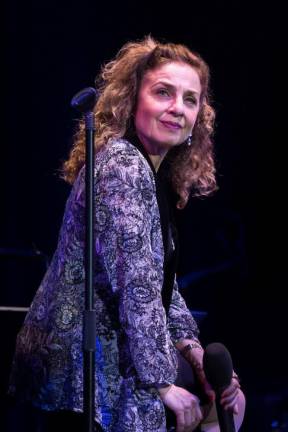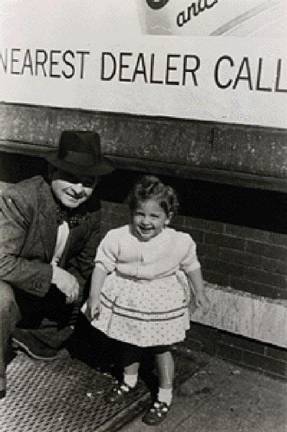Comprehending the Incomprehensible
Theatrical virtuoso Eleanor Reissa marshals her writing, stage skills and family history as the daughter of Holocaust survivors to make sure the 20th century’s darkest chapter is never forgotten – and never repeats itself


She’s been dubbed the “Jewish Beyonce” and the “Reigning Queen of the Yiddish Cabaret.” She’s a singer, actress, playwright, choreographer, librettist, translator, memoirist, Tony-nominated director, and master of the Great Yiddish Songbook – and her credits include Broadway, Off-Broadway, regional theater, film, TV, improv and stand-up.
Eleanor Reissa has performed in Carnegie Hall and Town Hall, Paris and Warsaw, Alaska and Montana, and she served from 1998 to 2003 as artistic director of the National Yiddish Theater Folksbiene. But that vast creative output is only part of her life story.
The Brooklyn-born, Upper West Sider, product of the city’s public school system and graduate of Brooklyn College, is the daughter of Polish-born Holocaust survivors. She’s also the narrator and host of a new podcast, “Those Who Were There: Voices from the Holocaust,” which taps first-hand testimony from the Fortunoff Video Archive for Holocaust Testimonies at Yale University.
On the eve of the 75th anniversary of the liberation of Auschwitz, which falls on Monday, Jan. 27 and is observed as International Holocaust Remembrance Day, we chatted about the imperative to remember, why for decades the victims rarely spoke of the inferno, the horrors her own family endured – and even how to bring the dead back to life.
In our first conversation, you said this: “I knew them, I touched them, I loved them, I kissed them, I ate with them.” Who were you talking about?
I was talking about all the refugees, the Jews who lived through the war, whose mother tongue was Yiddish, who loved and lived simply and directly. They were a community of not only relatives but friends of family and were plentiful in my life. They were in the bungalow colony in the Catskills, in the shul, in the grocery store. All over. They once walked the earth, like dinosaurs.
After all this time, why do the survivor stories matter now?
It was such an unspeakable event, such an inhuman event, such an impossible event, that we need to know that it was indeed possible. The unimaginable did happen. The stories in the podcast, told by the people who lived through that nightmare, puts a face on the horror. It shows the humanity of the inhumanity. The crime didn’t happen to faceless numbers. It was the murder and destruction of specific human beings, men, women, children, who loved and were loved, who cooked and painted and sang. They were alive – in the wrong place at the wrong time. What happens when we find ourselves in such a place? These real-life stories honor those who fought like hell to live to tell the tale. It is from them we will learn to beware of the signs of such things happening again, although I suspect we are blind to the marching boots until they march directly to our own door.
Hence the imperative to remember this dark past?
Millions of people, as well as my own father, lived in an unimaginable hell created by mankind, in an indescribably grotesque situation, and that such a thing could happen in a so-called civilized, modern society must always be remembered so it never happens again.
In the blink of an eye, the survivors will be gone. But your podcast offers a last chance to meet them. Tell us a little about it.
At one time, not so long ago, these survivors walked the face of the earth. You could meet them and speak to them. But they are disappearing. The end of that era is approaching. “Those Who Were There” keeps the voices of the survivors and witnesses alive and offers us the miracle of their company, and with it, their insight and knowledge, their heart and soul. It’s an enormous opportunity, not to be missed, and it’s free and available to everyone.
The survivors we meet endured the worst atrocities on earth. Yet they waited decades to tell their stories. Why?
I think time had to pass before the survivors themselves could actually speak about it. They were broken and ashamed and guilty and bereft. With what words could they speak? Primo Levi came as close as anyone I know in his “What is Man?” The world wasn’t ready either. It didn't want to know. Why? Their own shame? How much real-life horror can one bear? Even now, becoming inured to suffering is not uncommon.
Your own father, Chaskel Schlusselberg, barely talked of his ordeal at Auschwitz. What do you know of his story?
He really didn’t speak about it at all. One or two small details. About how he slept on his shoes so they wouldn’t be stolen, and that someone once gave him bread that helped save him. I asked about it, but it was clearly a source of pain to him, so I didn’t want to inflict anymore upon him. I always felt that it was my job to cheer him up, to make his life better. I found out later, years after his death in 1976, that he was in Auschwitz from 1943-1945 and was on the death march, that he had another daughter with his first wife, who were both killed; that he managed to send his son to safety on a kindertransport to England in 1938. He had saved his son’s life, but his son chose to remain in England, so my father lost him twice. Before the war he was a vibrant, active man. Here in the USA he was a broken man – a sweatshop worker who was always "the other."
Your mother, Ruth Hoff, also seldom spoke of being forced into slave labor in Uzbekistan. What do you know of her story?
She and her parents and her son, who was an infant – born in 1941, the year the Hitler-Stalin pact was broken – fled to Uzbekistan. They suffered terrible hardship there, typhus, hunger, beatings, forced labor. After the war, they went to Ulm, Germany in the American sector in 1946, to a displaced persons’ camp where they remained until they got visas to the U.S. in 1949. How they got from Poland to Uzbekistan in 1941 – look at a map, it’s thousands of kilometers – and then back to Germany in 1946 is unimaginable to me.
You told me, “It’s important to honor people who fought like the devil to stay alive.” How best can we do this?
It is incumbent on those of us who are not yet in danger to fight for those who are. I always wondered how the Germans could allow this to happen to their neighbors, how a cultured nation could sit by and do nothing, and now, in my own country, which I thought would always be a safe haven, I fear I too am sitting back and doing nothing. I see such horrible, inhuman acts being perpetrated by my own country and what exactly am I doing? Checking "like" on Facebook! Posting an angry emoji face? Clearly it’s not enough. Frankly, I’m frustrated by my own inactivity, and yet I don’t really know what to do. I am afraid I now understand a bit more about the passivity of the German people back then.
A Pew survey found just 38 percent of American teens knew six million Jews were exterminated in the Holocaust. How do you combat this?
Take a look at the podcast, which is accessible to everyone everywhere. The voices and stories in “Those Who Were There” are marvelous education tools. They teach history and empathy at the same time. They’re specific and human. It’s a remarkable opportunity to hear the past speak – a miracle actually where the dead don’t die – they remain with us to help us and teach us and guide us. I think they’d like that. I’m hoping the podcast leads to classroom visits. I’m not a survivor, but I feel that very soon I and other children of the survivors will be the only contact with that time. I’d love to go to schools and speak about those millions of people whose voices must be heard.
Once upon a time, the world turned its back on the Jews. Two words, “Never again,” became a mantra. Are we doing enough to ensure it never happens again?
Clearly not. I’m afraid there are some people who think “never again” only applies to their own people, their own religion or ethnicity. I’m afraid they don’t understand that “never again” applies to those who are made to feel as though they are "others" – strangers on this earth and vulnerable to the cruelties of powerful men.
In addition to your theatrical artistry, you are a storyteller by nature. Tell us a little about the memoir you’re writing, “The Letters Project.”
When my mother died in 1986, as I was clearing out her apartment, I found a trove of letters she never spoke about, letters I knew nothing about – 60 letters over a six-month period written in German in 1949 from her boyfriend, who was to become my father. Shockingly, it was not until 2017 that I finally managed to have them translated. When I did, I took a trip to Germany and uncovered actual details about my family I had no idea I could ever know ...That’s what the memoir is about.
Finally, you were a seventh-grader in junior high in Brooklyn when you read your first play, Thornton Wilder’s “Our Town,” in which Emily comes back from the dead. Why is that theme so resonant for you?
To me it was the ultimate truth about life and my desire, then and now. More than anything to really be seen and known. “Mama, just look at me for one moment as though you really saw me. I can’t look at everything hard enough ... Do any human beings realize life while they live it? Every, every minute?”
It was not until later, when I collected the plays I wrote into an anthology, that I realized they all ended with some form of the dead coming back to life. I missed them so much. I still do. I carry them with me. In all of my plays, I get the chance to be with friends and family who are no longer here – in fact, all of my work as a storyteller seems to include them, tries to give them a voice. Sometimes I feel that’s my job.
invreporter@strausnews.com